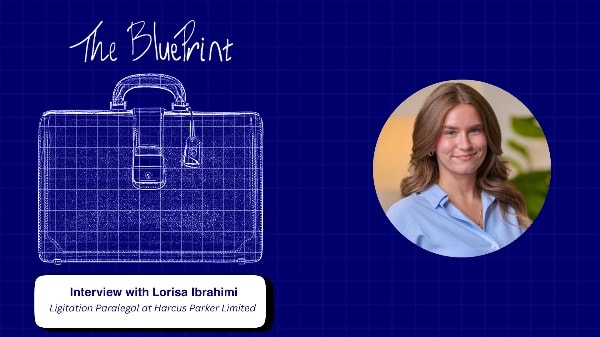Why persistence, transferable skills, and community matter more than prestige.
Breaking into law can feel impossible without the “perfect CV”. Stacked internships, prestigious firms, and straight As are often presented as the only way in. But Lorisa Ibrahimi, a paralegal, charity leader, and proud first-generation Kosovan Albanian, shows there’s another path.
Her journey proves that resilience, creativity, and community can matter more than pedigree. Here’s what I took away from our conversation and how you could apply it.
Family Roots as a Foundation
When asked if she thought she’d end up here before starting her degree, her answer was immediate:
- “Not at all. I thought I’d go down the politics route. But my family background changed that. I grew up listening to my mother and grandparents talk about the war in Kosovo, their displacement, and how it shaped their lives. It made me want to give back somehow, and law felt like the way to do that.”
Her father’s business also influenced her path.
- “I was basically his secretary. Drafting invoices, translating documents, and handling administrative tasks because I was the only one fluent in English. I enjoyed it and later, when I discovered law, it all clicked.”
How this could apply to you: Reflect on your own background. Write down three experiences outside of academics, family, work, or community and how they’ve built skills you can use in law. Use these to shape answers in applications and interviews.
Community as a Career Catalyst
Beyond her nine-to-five job, Lorisa serves as a trustee and law team lead at ALSA UK, a charity she helped establish to support students and professionals at every stage of their career.
- “ALSA is about community. We aim to provide individuals with the knowledge and connections to pursue their goals, whether that’s in business, academia, or law. And we want sustainable growth, so ALSA becomes a permanent fixture in people’s lives.”
A standout example was the Commercial Law Decoded event at A&O Shearman, where Albanian lawyers from top firms stripped away the jargon.
- “It was about demystifying commercial law, real, raw answers. No fluff. People left saying, ‘I can see myself in this industry,’ that's the impact.
Strategy Beyond the Classroom
At university, Lorisa served as vice president of the Pro Bono Society, where she received an award for her event marketing strategy.
- “We’re Gen Z, we live online. I encouraged the team to use Instagram to highlight speakers and explain why the event was important. If people know who’s coming and what they’ll get out of it, they’re more likely to show up.”
- “It’s also about removing the element of surprise. Let people research firms and come with questions. Give them something to get excited about.”
How this could apply to you: Before your next networking event, research the firms or speakers. Write down two questions you’d ask each. Preparation turns you from a passive attendee into an active networker.
Transferable Skills Are Underrated
This was my favourite part of the conversation because it challenges a common myth. When asked what experience was most useful in getting her paralegal role she mentioned:
- “Honestly? My retail job. People get fixated on legal experience, but retail taught me how to adapt my communication style and work with all kinds of people. Those skills are crucial in law.”
She’s also transparent about the challenges of landing legal placements.
- “I struggled to get experience because most firms wanted people who already had it, which I didn’t. But when I did get opportunities, I made sure to ask questions, observe, and take mental notes. That way, even without years of drafting behind me, I could show in interviews that I understood the basics.”
Looking Ahead
When asked where she sees herself in five years, her answer was ambitious yet grounded.
- “Short term, I want to secure my training contract and qualify as a solicitor. But I’ll also continue with ALSA and pro bono work. I like the best of both worlds: a career in commercial law and the opportunity to give back.”
- “I really believe in the saying, ‘What is meant for you will not pass you by.’ That’s how I’m approaching the future.”
How this could apply to you: Set one short-term (12 months) and one medium-term (3–5 years) career goal. Keep them flexible, yet concrete enough to track progress.
Practical Advice for Aspiring Lawyers
We wrapped up with quickfire tips.
For first-year students:
- “Manage your time well. Be intentional. Work hard early; it sets the tone. And make sure to create a LinkedIn profile straightaway.”
How this could apply to you: Time-block your week. Dedicate set slots for study, applications, and networking.
On LinkedIn strategy:
- “Add all experience, even non-legal. Highlight the skills you gained. Don’t stress about Premium. Put yourself as ‘open to work’ if you’re job-hunting, and make a couple of posts to build visibility.”
On networking:
- “Go to events like ALSA. Use LinkedIn to send messages to people for quick chats. Follow firms to stay on top of their work. Put yourself out there.”
How this could apply to you: Message three professionals this month. Keep it short: intro, why you’re reaching out, and one straightforward question.
Final Remarks
Lorisa’s story is proof that you don’t need a flawless resume to build a career in law. Persistence, transferable skills, and community can be just as powerful as grades and internships.
For anyone staring down rejection emails or doubting their path, her story is a reminder: there’s more than one way into law and your so-called imperfections might be your greatest strengths.
